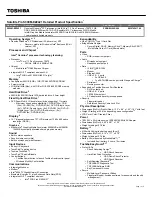
Internet and online security - 77
Review bank and credit card statements regularly
The impact of identity theft and online crimes can be greatly reduced if
you can catch it shortly after your data is stolen or when the first use
of your information is attempted. One of the easiest ways to get the
tip-off that something has gone wrong is by reviewing the monthly
statements provided by your bank and credit card companies for
anything out of the ordinary.
Additionally, many banks and services use fraud prevention systems
that call out unusual purchasing behavior (i.e. if you live in Texas and
all of the sudden start buying refrigerators in Budapest). In order to
confirm these out of the ordinary purchases, they might call you and
ask you to confirm them. Don't take these calls lightly; this is your hint
that something bad may have happened and you should take
necessary action.
Protect your computer with Windows security tools
Windows provides a variety of protection applications.
Windows Updates
If you have an active Internet connection, Windows can check for
important updates for your computer and install them automatically.
These updates include security patches and program updates that
can improve your computing experience and help protect your
computer against new viruses and attacks.
How do I know when my computer is at risk?
If the
Action Center
reports an alert, or if your computer behaves
erratically, crashes unexpectedly or if some of your programs do not
work correctly, your computer may be infected by malicious software.
However, do not blame every computer problem on a virus! If you
suspect your computer is infected, the first thing to do is update, if you
have not already done so, and run your antivirus and anti-spyware
software.


































